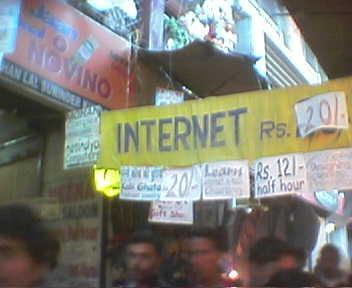Cafe controls in India's tech hub
Correspondents in Bangalore
INDIA'S southern state of Karnataka, of which the technology hub of Bangalore is the capital, is to restrict the use of internet cafes to fight cyber crime and pornography.Proposed new laws will make it compulsory for those using cybercafes to carry a photo-identity card and enter their details on an address book to be kept at the counter.
If no identity card is available, customers will be photographed by a web camera at the cafe and their photographs will be stored in the computer for a year.
"The main aim is to prevent the misuse of cybercafes," said M.K. Shankaralinge Gowda, secretary in the state's Information Technology and Biotechnology department. "It is meant to fight cyber crimes and pornography."
The law would be passed very soon, Mr Gowda said. "A bit of regulation is necessary and we do not want freedom to be misused."
Industry pundits, IT bodies and users, however, slammed the planned legislation, arguing it was an infringement of individual rights and will deal a severe blow to the industry which has been fighting to bring internet access to the poor.
India's premier IT body, the National Association of Software and Service Companies (NASSCOM), said the move would not help tackle the problem of security or pornography.
"It is not a good idea at all," said NASSCOM president Kiran Karnik. "We understand that there are security compulsions but this step will not be useful or good to tackle it as the system can still be abused either by the cafe owner or by customers."
Mr Karnik said a majority of the internet users in India used cybercafes as they could not afford to buy a computer.
"I do not think checking and registration of subscribers is a good idea. It also infringes on individual freedom," Mr Karnik said.
"This move will kill (cybercafe) business. In India internet access is a problem. The rich own personal computers while the poor cannot even afford to use it," he said.
According to NASSCOM, there were an estimated 13 million internet users in India last year. The base grew from less than a million subscribers in 1998.
Ashish Saboo, president of the Association of Public Internet Access Providers, a body of cybercafe owners, said the government step would hit the industry hard.
"Operating a cybercafe is no longer a lucrative business," Mr Saboo said. "When these regulations come into effect, I wonder how many will still risk operating?"
Cybercafes revenue was on the decline even though "about 30 per cent" of India's total internet users depend on them, Mr Saboo said.
Over the couple of years fierce competition has cut the cost of accessing the internet at cybercafes to as little as 15 rupees (45c) an hour.
Agence France-Presse

No comments:
Post a Comment